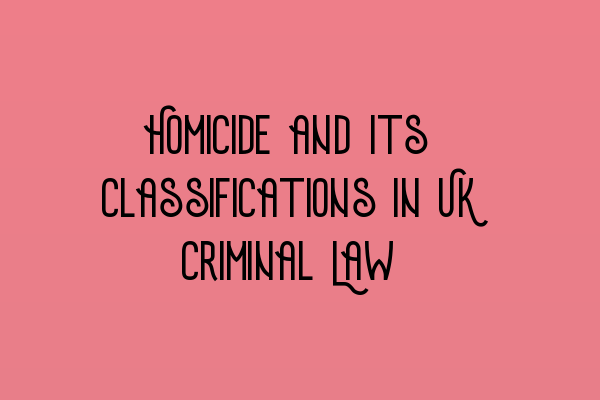Homicide and Its Classifications in UK Criminal Law
In UK criminal law, homicide refers to the act of unlawfully causing the death of another person. It is a serious offense that is classified into different categories based on the circumstances and intent of the offender. Understanding these classifications is crucial for both legal professionals and individuals seeking knowledge about criminal law. In this blog post, we will explore the various classifications of homicide in UK criminal law.
Murder
Murder is the most serious form of homicide, involving the intentional killing of another person with the malice aforethought. Malice aforethought refers to the premeditated intent to cause harm or the knowledge that one’s actions may result in death. The prosecution must prove beyond reasonable doubt that the defendant had the requisite intent to commit murder. To learn more about murder in the context of the SQE Criminal Law & Practice exam, you can read our comprehensive study guide on SQE 1 Practice Exam Questions.
Manslaughter
Manslaughter is a less severe form of homicide, usually resulting from negligent or reckless behavior rather than premeditation. It can be further categorized into two subcategories:
- Voluntary Manslaughter: In cases of voluntary manslaughter, the offender intended to cause serious harm but did not have the intent to kill. This can occur in situations where the offender loses control due to provocation or diminished responsibility. For a more in-depth understanding of voluntary manslaughter and its legal implications, we recommend reading our article on SQE 1 Practice Mocks FLK1 FLK2.
- Involuntary Manslaughter: Involuntary manslaughter occurs when a person unintentionally causes the death of another person through reckless or negligent actions. This can include situations where the offender fails to meet a duty of care or engages in dangerous behavior that results in someone’s death. To prepare for the SQE 2 exam, you can enroll in our specialized SQE 2 Preparation Courses that cover the topic of involuntary manslaughter extensively.
Infanticide
Infanticide is a distinct classification of homicide that applies specifically to the killing of a newborn child by its mother. Under UK law, infanticide is treated as a lesser offense than murder or manslaughter, recognizing the unique circumstances that may lead a mother to commit such an act. To gain a comprehensive understanding of infanticide within the context of UK criminal law, we recommend exploring our article on SQE 1 Preparation Courses.
Further Resources and Exam Dates
To further enhance your knowledge of homicide and other relevant topics in UK criminal law, we encourage you to explore our wide range of resources and courses specifically designed for the SQE exams. You can find more information about SQE exam dates and how to prepare by visiting our page on SRA SQE Exam Dates.
Remember, becoming proficient in criminal law and practice is essential to excel in the legal profession. By familiarizing yourself with different classifications of homicide, you will be better equipped to navigate complex legal scenarios. Stay tuned for more informative content on our blog and feel free to reach out to SQE Criminal Law & Practice Law UK if you have any questions or require further assistance.
